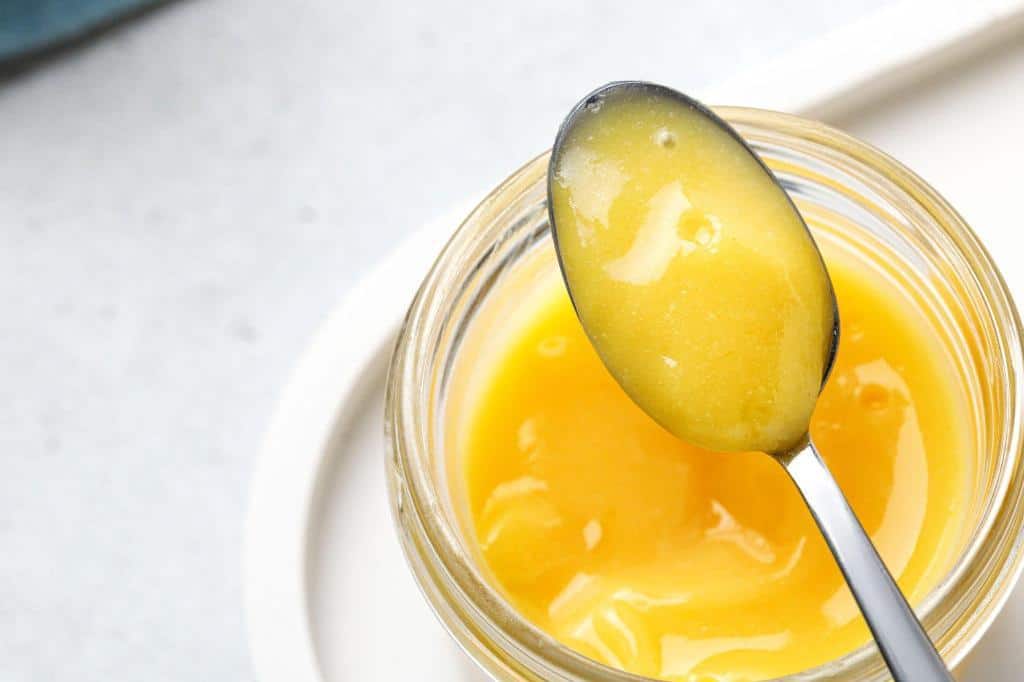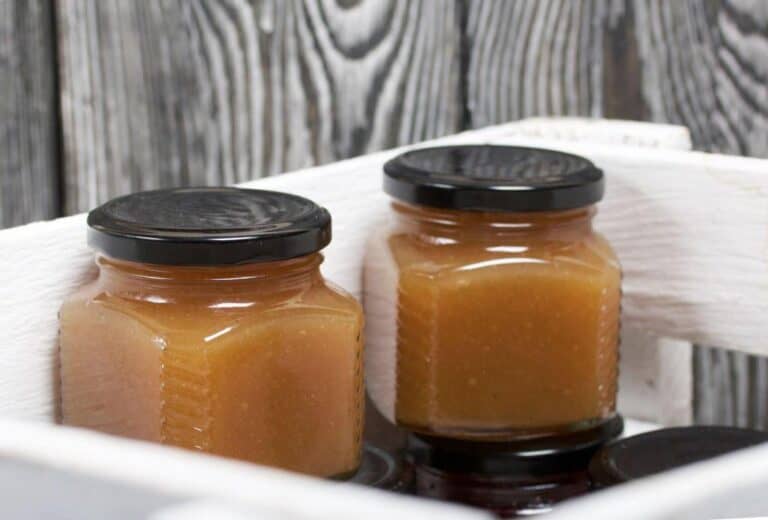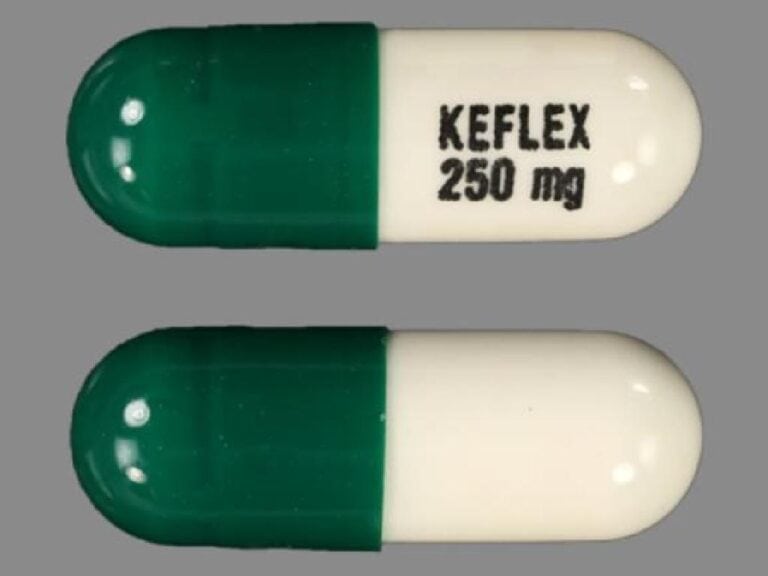How To Avoid 10 Lemon Curd Mistakes (Make Perfect Lemon Curd)

Lemon curd is a delicious spread or topping for many desserts. While it may seem like a difficult task to make at home, it is actually quite simple. With just a few ingredients and some patience, you can create a delicious lemon curd that will impress your family and friends.
Making your own lemon curd only requires a few ingredients that you likely already have in your kitchen. Despite its popularity, lemon curd can be tricky to make. You want to achieve the best tasting curd with the right texture; not too thick and not runny.
We’ve all been there. You’re in the kitchen, following a lemon curd recipe to the best of your ability. But somehow, things have gone wrong.
To avoid these cooking disasters, understand some common mistakes in making simple dishes like lemon curd. This article will provide 10 common mistakes in making lemon curds and how to avoid them
1. Lumpy Lemon Curd
Lumpy lemon curd is a common problem that can be caused by several different things. The most common cause is not stirring the curd frequently enough while it’s cooking. Another possible cause is cooking the curd at too high of a temperature.
If your lemon curd is lumpy, there are a few things you can try to fix. First, you can try whisking it vigorously to break up the lumps. If that doesn’t work, you can put it back on the stove and cook it for a few more minutes, stirring constantly. If all else fails, you can always strain the lumpy lemon curd through a fine-mesh sieve.
2. Lemon Curd is too Thick
If your lemon curd looks too thick, you can add a little bit of water or lemon juice to loosen it up. The amount depends on how much you need to thin it out and what consistency you want!
3. Runny Lemon Curd
If your lemon curds are too thin, it can ruin the dish. There are a few different causes of thin lemon curd, and thankfully, there are also a few ways to fix it.
One common cause of thin lemon curd is not cooking it long enough. It should be cooked until it’s thickened and bubbly; if it’s not cooked long enough, it will be thinner and runnier.
Another possible cause is using too much liquid when making the lemon curd. Be sure to use the amounts of lemon juice, sugar, and butter specified in the recipe; using more liquid will make the lemon curd thinner.
| If your lemon curd is too thin, there are a few things you can do to fix it. One option is to cook the curd longer. If you cooked it correctly the first time, this will thicken the lemon curd. Another option is to add more butter after cooking and whisking the curd. This will thicken it and add flavor. |
4. Lemon Curd is Grainy
This is a common problem that results from overcooking the lemon curd. The most important thing you can do is not cook it for too long!
Cook it for 10 minutes, then check the consistency. If you need to cook it longer, do so in 5 minute increments.
You can also try using a double boiler instead of direct heat. This will keep the curd from getting too hot while still giving it enough energy to cook properly.
5. Lemon Curd Become Sour

When making lemon curd, the ingredients list is pretty straightforward, but the process of making it can be tricky. One misstep can result in a batch of sour lemon curd.
So, what causes lemon curd to become sour? There are a few reasons why lemon curd can become sour.
- The most common culprit is using too much lemon juice. When making lemon curd, be sure to use the amount of juice specified in the lemon curd recipe. Too much acid will make the curd sour.
- If the lemon juice is not fresh, it can cause the curd to spoil.
- If the eggs in the recipe are not cooked properly, they can also turn the curd sour.
- Another possible cause of sour lemon curd is undercooking it. Lemon curd should be cooked until it’s thick enough to coat the back of a spoon.
- If the curd is not stored properly, it can develop bacteria that will make it sour.
To avoid these problems, be sure to use fresh lemon juice and cook the eggs thoroughly before adding them to the mixture. If you are using store-bought lemon curd, be sure to check the expiration date and store it in the fridge once opened.
6. Flat Taste
Sometimes lemon curd can turn out flat and tasteless. This is usually due to one of two mistakes: either not enough lemon juice was used, or the curd was cooked for too long.
If your lemon curd is lacking in flavor, try adding more lemon juice. Start with a tablespoon and taste the curd before adding more. If the curd is still not tart enough, cook it for a shorter period of time. Be careful not to overcook it, or the eggs will start to scramble and the texture will be ruined.
7. Not Sweet Enough
When making curd, the level of sweetness can change depending on how sour the fruit is. If you’re unsure, start with less sugar and gradually increase the amount.
Before you add sugar to your curd, think about what you will do with it. Desserts that are really sweet, such as pavlova, a rich cake, or ice cream, pair wonderfully with a curd that is on the tangier side, and vice versa.
You may add honey, agave, coconut sugar, or even rapadura sugar to sweeten your curd. Be aware that your curd will have a different flavor and color after adding them.
8. Foamy Lemon Curd

Here are three common mistakes that can result in a foamy, rather than a smooth, thicker and creamy lemon curd.
Overbeating the egg yolks is the first mistake. When you whisk the yolks too much, they start to foam up, and the lemon curd will be grainy and frothy.
Another mistake is not cooking the curd for long enough. It needs to simmer until it’s thick enough to coat the back of a spoon. If it’s not cooked long enough, it will be runny and won’t set properly.
Finally, adding too much liquid can also cause problems. If you add too much lemon juice or water, the curd will be thin and runny.
9. Smells of Eggs
There are a few possible causes for this problem. One is that you may have used too much egg yolk in your recipe. When making lemon curd, different recipes call for whole eggs, egg yolks, or both.
Another possibility is that you didn’t cook the lemon curd long enough or at a high enough temperature.
If your lemon curd smells like eggs, don’t despair. There are a few simple things you can do to fix it. First, try cooking the mixture for a bit longer. If that doesn’t work, you can try adding more lemon juice or lemon zest to balance out the flavor.
10.Yellowish-brown Skin Layer on Top
This is caused by overcooking the lemon curd, or by cooking it too quickly in the saucepan at the beginning. You can scoop the skin off with a spoon, but it’s not necessary. If you want to remove it, make sure you do so before adding the butter.
Another option is to remove the lemon curd from the heat earlier and let it sit for 15 minutes or so before adding the butter. This will allow it to cool down and the skin to form, which you can then scoop off. It should be placed back over medium heat in a saucepan.
How Much Butter and Sugar Should You Put in a Lemon Curd?
Lemon curd is a delicious spread or filling for cakes and pastries. It is made by cooking lemon juice, lemon zest, sugar, and butter together until thick and creamy.
The amount of sugar and butter you use will depend on how tart or sweet you want your curd to be. Start with 1/2 cup sugar and 1/4 cup butter, and go from there.
- If you don’t have enough butter in your lemon curd, it will be very dry and gritty.
- If you don’t have enough sugar, it will be too tart.
- Lemon curd should be smooth and creamy, with no lumps of butter or sugar.
- The easiest way to make sure that your lemon curd is smooth and creamy is to use a mixer.
- Lemon curd can be made up to 2 weeks ahead and stored in the refrigerator.
There are many recipes that use plant-based oils in place of butter. This is if you’re looking for a vegan lemon curd or not keen on lemon curd that has dairy ingredients.
Some people perhaps want to try different lemon curd substitute with their mixture choices and flavors. Whatever recipe you choose, enjoy your homemade lemon curd on fresh baked bread or as a topping for your favorite desserts!
Can You Still Eat Expired Lemon Curd?
A lot of people are wondering whether or not they can eat expired lemon curd. The answer is yes, you can! However, there are a few things to keep in mind.
First of all, make sure that the lemon curd is stored properly. If it’s been sitting out on the counter for a while, it’s probably best to throw it away.
Secondly, take a look at the expiration date. If it’s expired by a few days or weeks, it should be fine to eat. However, if it’s expired by months or years, it’s probably best to avoid it.
Lastly, trust your nose! If the lemon curd smells off or has mold growing on it, don’t eat it.
So there you have it!
Lemon Curd Mistakes: How to Avoid Them: Conclusion
Lemon curd is a delicious, tart spread made from lemons, sugar, and eggs. It is often used as a filling for cakes or pastries, or as a spread on toast or scones.
One mistake that people often make when making lemon curd is not cooking the mixture long enough. The mixture needs to be cooked over low heat in the saucepan until it thickens and coats the back of a spoon. If it isn’t cooked long enough, it will be runny and won’t have the desired consistency.
Another mistake that people make is not using fresh lemons. The lemon flavor will be much more pronounced if you use fresh lemons rather than bottled lemon juice. If you don’t have fresh lemons on hand, you can also use lime juice or orange juice.
Finally, people sometimes add too much sugar to their lemon curd.






